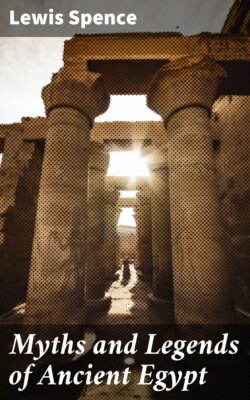Читать книгу Myths and Legends of Ancient Egypt - Lewis Spence - Страница 46
На сайте Литреса книга снята с продажи.
The Myth of Osiris
ОглавлениеPlutarch is our principal authority for the legend of Osiris. A complete version of the tale is not to be found in Egyptian texts, though these confirm the accounts given by the Greek writers. The following is a brief account of the myth as it is related in Plutarch's De Iside et Osiride:
Rhea (the Egyptian Nut, the sky-goddess) was the wife of Helios (Ra). She was, however, beloved by Kronos (Geb), whose affection she returned. When Ra discovered his wife's infidelity he was wrathful indeed, and pronounced a curse upon her, saying that her child should not be born in any month or in any year. Now the curse of Ra the mighty could not be turned aside, for Ra was the chief of all the gods. In her distress Nut called upon the god Thoth (the Greek Hermes), who also loved her. Thoth knew that the curse of Ra must be fulfilled, yet by a very cunning stratagem he found a way out of the difficulty. He went to Silene, the moon-goddess, whose light rivalled that of the sun himself, and challenged her[2] to a game of tables. The stakes on both sides were high, but Silene staked some of her light, the seventieth part of each of her illuminations, and lost. Thus it came about that her light wanes and dwindles at certain periods, so that she is no longer the rival of the sun. From the light which he had won from the moon-goddess Thoth made five days which he added to the year (at that time consisting of three hundred and sixty days) in such wise that they belonged neither to the preceding nor to the following year, nor to any month. On these five days Nut was delivered of her five children. Osiris was born on the first day, Horus on the second, Set on the third, Isis on the fourth, and Nephthys on the fifth.[3] On the birth of Osiris a loud voice was heard throughout all the world saying, "The lord of all the earth is born!" A slightly different tradition relates that a certain man named Pamyles, carrying water from the temple of Ra at Thebes, heard a voice commanding him to proclaim the birth of "the good and great king Osiris," which he straightway did. For this reason the education of the young Osiris was entrusted to Pamyles. Thus, it is said, was the festival of the Pamilia instituted.
In course of time the prophecies concerning Osiris were fulfilled, and he became a great and wise king. The land of Egypt flourished under his rule as it had never done heretofore. Like many another 'hero-god,' he set himself the task of civilizing his people, who at his coming were in a very barbarous condition, indulging in cannibalistic and other savage practices. He gave them a code of laws, taught them the arts of husbandry, and showed them the proper rites wherewith to worship the gods. And when he had succeeded in establishing law and order in Egypt he betook himself to distant lands to continue there his work of civilization. So gentle and good was he, and so pleasant were his methods of instilling knowledge into the minds of the barbarians, that they worshipped the very ground whereon he trod.
